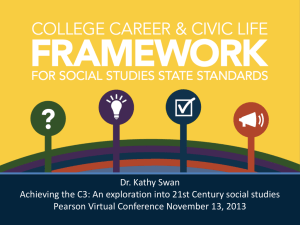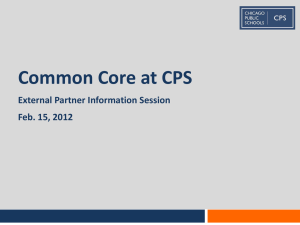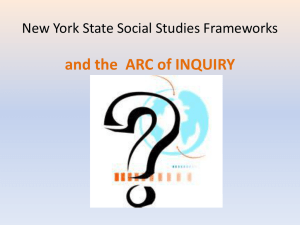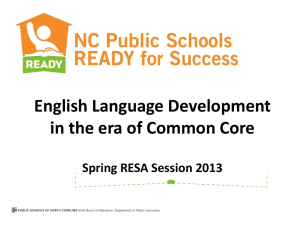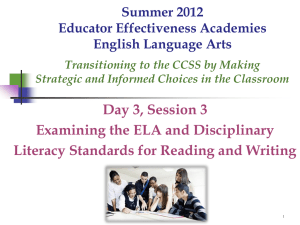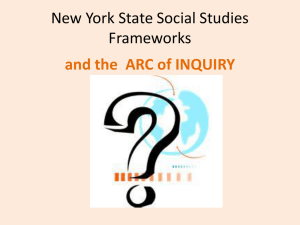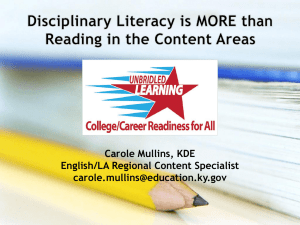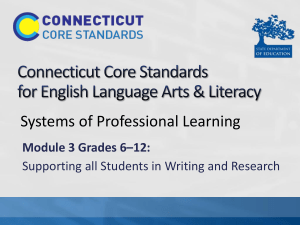Practicing What We Preach: The Human Mosaic of the C3 Framework
advertisement
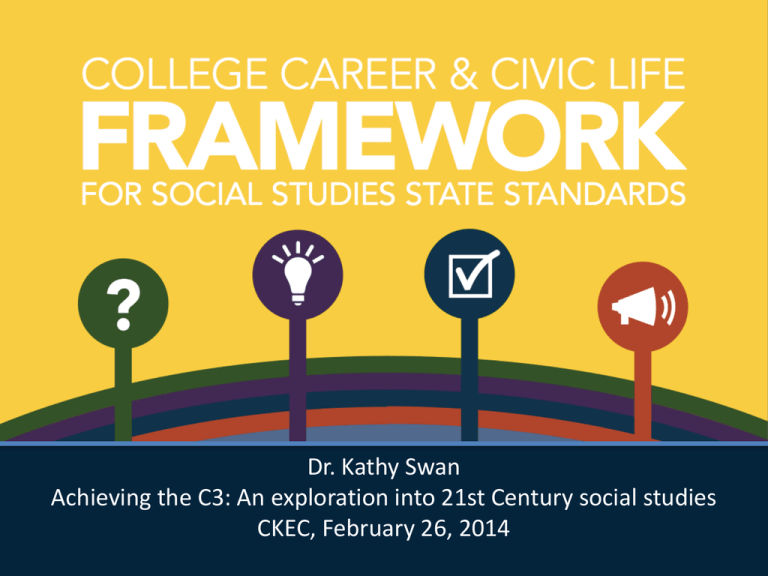
Dr. Kathy Swan Achieving the C3: An exploration into 21st Century social studies CKEC, February 26, 2014 My favorite moment this week! Elephant in the Room What is Social Studies? • We explore the following questions: – What does it mean to be human? – What does is mean to be humane? • We apply disciplinary perspectives/lenses to human issues, events and ideas: – – – – Political Economic Geographic Historical • We apply what we have learned in a meaningful way. Should government assist corporations in developing hybrid technologies? Where does this technology find the most “wiggle room”? Rural, urban and/or suburban communities? Gendered? How do we create a tax environment to spur this innovation? Do hybrid technologies enhance the common good? Can and should we do something about them? What innovations in the past created social, political, economic change? Chaine operatoire? ? ? ? ? ? ? ? ? ? ? ? ? C3 Foundations C3 Inquiry Arc College, Career and Civic Life (C3) Framework for Social Studies State Standards: Guidance for enhancing the rigor of K-12 civics, economics, geography and history C3 Inquiry Arc What is the C3 Framework? • Dimension 1: Developing Questions and Planning Inquiries • Dimension 2: Applying Disciplinary Tools and Concepts (Civics, Economics, Geography, and History) • Dimension 3: Evaluating Sources and Using Evidence • Dimension 4: Communicating Conclusions and Taking Informed Action C3 Framework Organization Dimension 2: Applying Disciplinary Tools and Concepts History K-12 Pathway Common Core ELA What is the C3 Framework? The C3 Framework fully incorporates and extends the expectations for literacy learning put forward in the ELA Common Core. We view the literacy skills detailed in the ELA Common Core as establishing a foundation for inquiry in social studies. These literacy skills are an indispensable part of social studies. Common Core ELA What is the C3 Framework? • Foundational, Supportive, and Vital Connections to CC Anchor Standards • Shared Language – e.g., argumentation, evidence, sources, discourse • Graphical and Narrative Explanations threaded throughout C3 Inquiry • • • • • Disciplinary C3 Literacies What is the C3 Framework? • • • • • Questioning Selecting sources Gathering information from sources Evaluating sources Making claims Using evidence Constructing arguments and explanations Adapting arguments and explanations Presenting arguments and explanations Critiquing arguments and explanations Analyzing social problems Assessing options for action Taking informed action • • • • • • • • Making economic decisions Using economic data Identifying prices in a market • Using deliberative processes Participating in school settings Following rules • • • Reasoning spatially Constructing maps Using geographic data • • Classifying historical sources Determining the purpose of an historical source Analyzing cause and effect in history • What is the C3 Framework? C3 Framework? is theEngagement WhatCivic Now more than ever, students need the intellectual power to recognize societal problems, ask good questions and develop robust investigations into them, consider possible solutions and consequences, separate evidencebased claims from parochial opinions, and communicate and act upon what they learn. What is the C3 Framework? C3 Framework? is theEngagement WhatCivic • The Civic Arc of the C3. • Civil and democratic discourse within a diverse and collaborative context. – e.g., Individually and with others, students will… – e.g., D2.Civ.9.9-12. Use appropriate deliberative processes in multiple settings. • Taking Informed Action in Kentucky? How will the C3 Framework the C3 do What can be used? • Foundation for new standards Next Steps • Recalibrate Relationship w/ Literacy • Professional Learning (In-service and pre-service) framed by an Instructional Arc • Curriculum and Instruction • Assessment reform • To explain to policy makers: “What is social studies and how does it contribute to the 3 C’s?” Teaching the C3 Framework: A Guide to Inquiry-based Instruction in Social Studies Newseum Smithsonian American History Museum Smithsonian American Indian Museum Bill of Rights Institute Gilder Lehrman National Archives Library of Congress Center for Action Civics National History Day Facing History & Ourselves Federal Reserve National Constitution Center Colonial Williamsburg Ford’s Theater Center for Economic Education and Entrepreneurship National Geographic Big History What have we learned so far? • Curricular partners have strengths and weaknesses when it comes to the “Instructional Arc” of the C3; • Not starting from scratch, but re-mixing or shifting existing resources to align with C3; • Educational reform language is problematic – No teacher wants an extreme makeover; • Identifying key instructional shifts could be helpful for the professional learning of teachers and create awareness of the C3 as an instructional tool. Instructional Shifts of the C3* Social Studies teachers will need to: • Craft questions that matter. • Create and maintain a learning environment to support inquiry. • Integrate content and skills meaningfully (reconcile the breadth/depth debate). • Become explicit (clear) about disciplinary literacy outcomes and practices. • Get serious about civic life/informed action. *Under Construction: Hot off the Presses! 16 C3 32.06 I nstructional Shifts Iodine 1. Craft questions that matter. 2. Establish a collaborative context to support student inquiry. 3. Integrate content and skills meaningfully. 4. Articulate disciplinary literacy practices and outcomes. 5. Provide tangible opportunities for taking informed action. How do you Achieve C3? Tell me what you think. Time to get our C3 on! c3teachers.org
